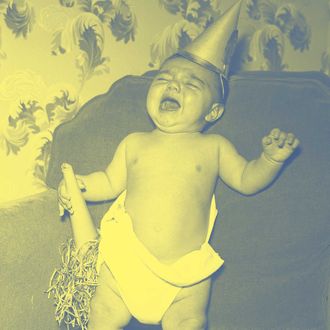
You may have seen by now that web-only clip of Last Week Tonight with John Oliver, in which Oliver emerges from hiatus to yell for a bit about how New Year’s Eve celebrations are the worst and we should all probably just stay home with our cats, or something to that effect. As is so often the case with Oliver’s rants, he is probably correct. Your high expectations of having a fun New Year’s Eve will most likely mean the actual events of the night will turn out to be a big fat disappointment, according to a funny and clever bit of research from behavioral scientist and best-selling author Dan Ariely.
Back in 1999, Ariely and a team of researchers at the University of Pittsburgh and Carnegie Mellon University decided to use the excitement over the impending new millennium as a way to study a theory they held about happiness — that high expectations usually lead to crushing disappointment. (You can read a PDF of the study here, if you’re so inclined.) In the weeks before December 31 of that year, they surveyed 475 people about their plans for celebrating New Year’s Eve — were they throwing a big party? staying in? — and how much fun they expected to have. Over the next two months, Ariely and the other researchers asked their participants these same questions and recorded their answers about their actual experiences. Most people — 83 percent — said they’d been disappointed by their New Year’s Eve celebrations.
Ariely and his co-authors expand on that in their paper, which was published in a 2003 text called The Psychology of Economic Decisions:
More interestingly, the size of the planned celebration had an effect on the enjoyment difference. The effect of the planned celebration size was such that respondents who indicated they expected to have a bash were the most disappointed, followed by participants who expected a small celebration, followed by the participants who did not expect celebration at all.
They conclude that their findings confirm their suspicions that “high expectation can lead to disappointment, and that spending time and effort (and perhaps money) into an event can increase dissatisfaction.” This ties into subsequent research on the psychology of happiness, not to mention folk wisdom: that single-mindedly chasing after happiness is about the surest way to guarantee disappointment.
Similarly, in his new(ish) book, Happiness by Design: Change What You Do, Not How You Think (which we covered here), behavioral scientist Paul Dolan touches on his own research on expectations and happiness, and how keeping modest expectations can help you avoid false hope:
False hope springs from optimism, but having modest expectations need not be incompatible with optimism. Optimism research teaches us that we should expect the best and have a contingency plan for the worst. It doesn’t mean we always need to expect the very best or ignore the worst when it occurs. When facing an uncertain future, the rose-colored glasses of optimism serve us just fine, as long as we can take them off from time to time for a dose of realism. Although figuring out what are and are not sensible expectations is difficult, you should at least experience pleasure and purpose as you work toward a goal you have set.
Dolan also nods to that paper on the disappointment of New Year’s in 1999. “And you know that about nights out on the town: the best ones tend to be unplanned,” Dolan writes. “In the end, expecting to be very happy is probably a surefire way of not being so.”




